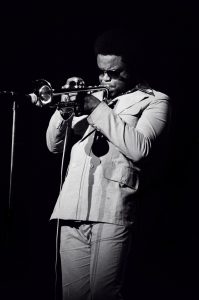
Photo info ...
Freddie Hubbard, 1976 Credit: Tom Marcello Webster, New York, USA via Wikimedia Commons View Source(Apr. 7, 1938 -Dec. 29, 2008). Born and raised in Indianapolis, Frederick Dewayne (Freddie) Hubbard was a legendary jazz trumpeter known for being bold and inventive. His music career started when he was just a teenager attending . While in the school band, Hubbard learned to play multiple instruments, including the alto-brass mellophone, the French horn, and tuba, but ultimately settled on the trumpet. During this time, he assembled his first band, the Jazz Contemporaries, and performed at George’s Bar on . He also worked and recorded with the Montgomery Brothers (See and ).
After graduating high school, Hubbard studied at the and was mentored by Max Woodbury, the principal trumpeter of the . Eager to establish himself in the jazz scene, Hubbard dropped out of college and set off for New York City in 1958. He quickly landed gigs, working with such talented musicians as , Sonny Rollins, Slide Hampton (see ), and Quincy Jones.
In 1960, at the age of 22 years old, Blue Note signed Hubbard for his solo debut album, Open Sesame. By the next year, he had released three more recordings—”Goin’ Up,” “Hub Cap,” and “Ready for Freddie,” marking the start of Hubbard’s popularity and reputation as a brilliant trumpeter. In 1961, he joined jazz drummer Art Blakey’s Jazz Messengers and played with them until 1964, when he formed his own small group. During this time, he also played and recorded with bands led by a variety of other high-profile jazz artists.
Through the 1970s, Hubbard appeared on several albums for CTI Records including Red Clay (1970), Straight Life (1970), and First Light (1971), which won a Grammy award in 1972. He also worked with jazz musicians Herbie Hancock, Tony Williams, Ron Carter, and Wayne Shorter in 1977 on several V.S.O.P albums. Towards the end of the 1970s, Hubbard began playing more pop and r&b style music as evidenced by his collaboration with singer-songwriter Billy Joel. Hubbard played a solo on “Zanzibar” on Joel’s album, 52nd Street.
Hubbard started his own group in the 1980s that played hard bop (based on predetermined chord progression) and modal jazz (predetermined on a certain musical scale).
The group proved successful, performing at concerts and festivals all over the United States and Europe. In addition, Hubbard continued collaborating with other musicians on projects, including a live recording with Blakey in the Netherlands, as well as performing in a song on prolific British rock and pop musician and songwriter Elton John’s 1988 album Reg Strikes Back.
In 1990, Hubbard spent time working abroad. He performed at a concert in Japan and at the Warsaw Jazz Festival in Poland. The rest of the early 1990s proved difficult for Hubbard. In 1992, he ruptured his lip and developed an infection. This injury hampered Hubbard’s ability to play and led to a drinking problem, which he would go on to overcome after a hospital stay. Hubbard was eventually able to play again but not to his previous level of ability.
At the end of his career, Hubbard performed and recorded with the all-acoustic ensemble New Jazz Composers Octet, out of which came two albums, New Colors (2001) and On the Real Side (2008). In addition to this, he spent time teaching his craft in clinics and residencies around the country. In 2006, Hubbard was awarded the Jazz Masters Award from the National Endowment for the Arts in recognition of his talents. By the end of Hubbard’s career, he had played on over 300 records.

Help improve this entry
Contribute information, offer corrections, suggest images.
You can also recommend new entries related to this topic.